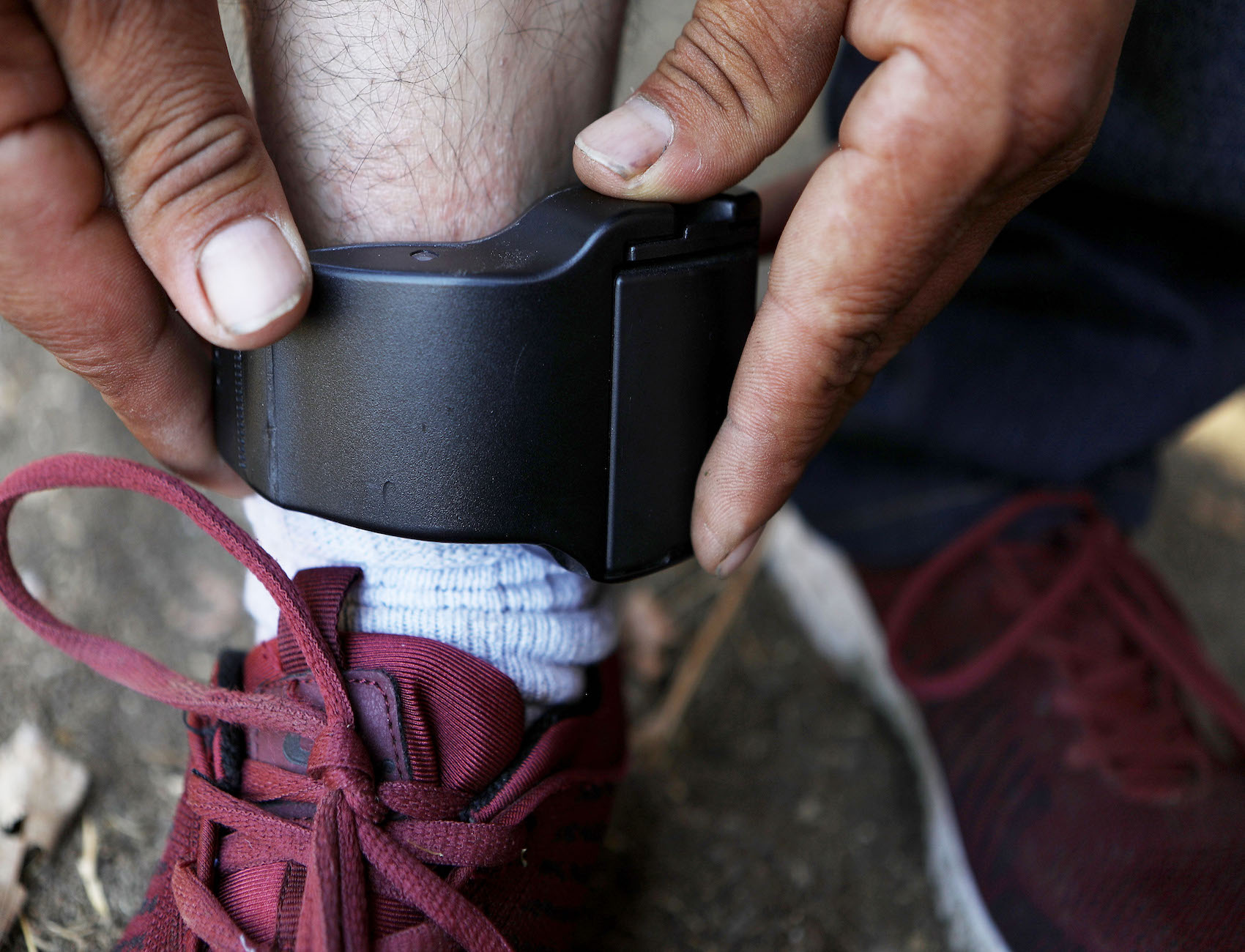In One Arizona County, Pay For Your Ankle Monitor Or Go To Jail
A lawsuit is challenging Mohave County’s practice of charging certain people for mandatory GPS monitoring before trial.

As states move away from cash bail, some are shifting to expensive monitoring systems to keep tabs on people charged with crimes. The practice has come under fire in Arizona where GPS monitoring is only mandated for individuals accused of certain crimes, and particularly in Mohave County where it costs defendants a pretty penny.
The American Civil Liberties Union argued Thursday before the Arizona Court of Appeals that the state’s law requiring anyone charged with certain offenses to be monitored, and Mohave County’s requirement that people pay for it, are violations of the Constitution.
The case began when one man, 34-year-old Robert Hiskett, was charged with a sex offense against a minor in December 2018. A Mohave County judge ruled that Hiskett wear an ankle monitor in lieu of paying a cash bail before his trial.
Hiskett denies the charges against but preferred GPS monitoring to alternatives. That is until he got the bill which totaled $400 a month, a major financial burden for someone in his situation. Making matters worse, it’s the policy of Mohave County to jail defendants for missing payments.
“Having to pay, like, $200 every two weeks kind of makes it hard to survive and pay all my legal bills and everything,” Hiskett told The Appeal. “I expected a cost, obviously, but $200 every two weeks? That’s insane.”
It was a point made by Hiskett’s defense attorney, Mike Wozniak, when requested that the fees be paid by the county. However, in response to the request, a judge moved on May 16 to revoke the electronic monitoring and ordered Hiskett jailed with a bond set at $100,000.
He couldn’t collect that kind of money and consequently spent three weeks in jail until the Court of Appeals issued an emergency ruling to reverse the decision, allowing him back out on his expensive ankle monitor.
“The next iteration of abusive pretrial punishment are these schemes of really onerous and unnecessary conditions of pretrial release,” said Andrea Woods, an attorney with the ACLU Criminal Law Reform Project. “It’s such an affront to the presumption of innocence and it’s a practice that we’re seeing all over the country that really can put a lot of people back in jail because they couldn’t afford a sum of money, which is what we were fighting to begin with.”
In court documents, the ACLU argues that Mohave County’s practice of making people pay for their own GPS monitoring violates the Fourth, Eighth, and Fourteenth Amendments. Tracking someone’s movement is an unlawful search, said attorneys for the group. They also argued that there are less onerous ways to get someone to show up to court and that the county doesn’t take into account a person’s ability to pay fees.
“People don’t forfeit their constitutional rights just because they’ve been accused of a crime,” Woods said.
A focus on the bottom line might explain why Mohave County embraces such a practice. The county currently contracts with a company called SCRAM of Arizona to provide GPS monitoring services. Previously, it worked with BI Inc., a subsidiary of Geo Group, which charged users significantly less than SCRAM does now.
When Wozniak questioned the increased fees, Alan Palomino, Mohave County’s chief probation officer, replied in an email that the county wanted a company that wouldn’t cost it anything, that was “completely defendant pay,” according to court documents.
“Let’s not give people a pass on the criminal acts they commit,” added Palomino.
Representatives for the county attorney’s office did not respond to a request for comment, but in a court filing, former Deputy County Attorney Megan McCoy argued that the state did not think the $100,000 bond was unfair but took no position on whether Hiskett should pay for his electronic monitoring.
Wozniak said he is representing two other clients in similar situations who cannot afford the costs of the required electronic monitoring. “Robert [Hiskett] is gainfully employed and does fairly well, but my other two clients are completely indigent and just had no ability to pay,” Wozniak said.
The ACLU has stepped in to fight the excessive pretrial conditions for all three individuals and is hoping for a ruling that would apply widely, Woods said. The organization expects the Court of Appeals to find, at minimum, that it’s unconstitutional for people to pay for their own electronic monitoring, given that the Arizona Attorney General previously took that position in an amicus curiae brief.
If nothing changes, Hiskett said he can come up with the more than $10 a day for his monitor until his December trial date, but it’ll come at the expense of other bills and supporting his daughter. Still, he said he doesn’t understand why he’s being punished “even though they haven’t said innocent or guilty yet.”
“It makes me feel like they’ve already decided,” he said. “It’s supposed to be innocent until proven guilty, but I feel like I’ve been treated like I’m guilty the whole time.”
